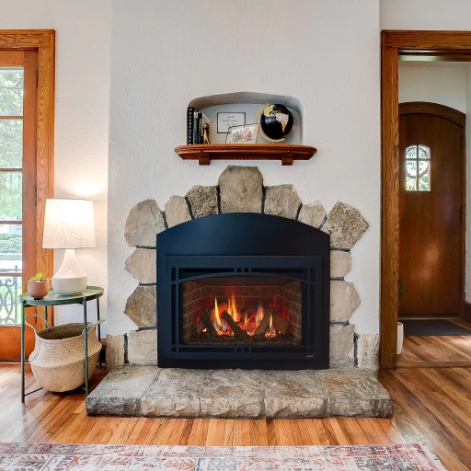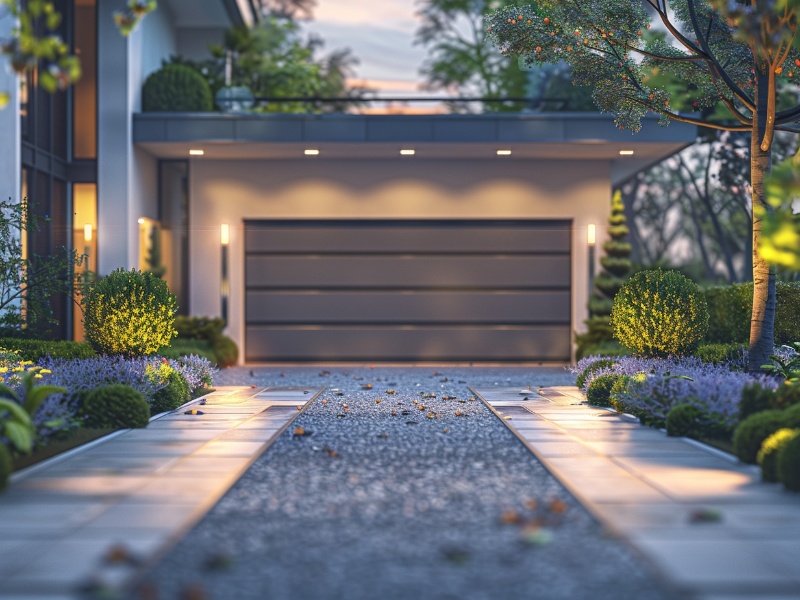Table of Contents
Garage doors are an essential feature of every home, providing security and convenience for homeowners. But have you ever wondered how big garage doors are?
We will explore the standard sizes for garage doors and the factors that can affect their size. Delve into the different types of garage doors available, the materials used to make them, common features such as insulation and windows, and how much a garage door typically costs.
Whether you’re in the market for a new garage door or simply curious about these everyday fixtures, this article has all the information you need.
What Are Garage Doors?
Garage doors are essential components of both residential and commercial properties, providing security, functionality, and aesthetic appeal to the overall structure.
These doors play a crucial role in safeguarding vehicles, equipment, and valuable items stored inside the garage, ensuring a sense of protection and privacy for homeowners and businesses alike.
Garage doors contribute significantly to the overall curb appeal of a property, influencing its market value and leaving a lasting impression on visitors. Their convenient operation allows for easy access and smooth functionality, making them a practical addition to any property.
The durability and reliability of garage doors make them a worthwhile investment that enhances the overall functionality and appearance of a building.
How Big Are Garage Doors?
Garage doors come in various sizes to accommodate different needs, with common, custom, and average dimensions available to suit a wide range of properties.
These sizes provide flexibility for homeowners looking to enhance both the functionality and aesthetics of their homes. Common dimensions, such as single car garage doors typically measuring 8×7 feet, or double car garage doors around 16×7 feet, cater to standard requirements. For those seeking custom options, garage door sizes can be tailored to fit unique spaces, with heights ranging from 6 to 8 feet and widths varying from 6 to 20 feet, allowing for a perfect fit regardless of space constraints.
What Are the Standard Sizes for Garage Doors?
Standard garage door sizes typically include double and single options, with specific widths and heights that conform to industry norms for easy installation and compatibility.
- Double garage doors commonly have a width of 16 feet and a height of 7 to 8 feet, providing ample space for larger vehicles or two vehicles side by side.
- Single garage doors, on the other hand, are typically 8 to 9 feet wide and 7 feet high, offering a more space-efficient solution for smaller garages or single-car parking needs.
These dimensions are standard in the industry, but variations can occur based on the specific requirements of the property or homeowner.
What Are the Factors That Affect the Size of Garage Doors?
Several factors influence the size of garage doors, including the dimensions of the space, preferences for large or small doors, and the ease of installation based on property requirements.
Space constraints play a significant role in determining the garage door size; smaller spaces typically require doors with more compact dimensions for efficient functionality. Homeowner preferences also impact the choice between larger doors for added storage space or smaller doors for a sleeker aesthetic.
When considering installation, it is crucial to assess the property layout to ensure that the selected door size aligns with structural constraints and offers seamless functionality. The variability in size options allows for customization to suit specific needs and enhance the overall appearance of the property.
What Are the Different Types of Garage Doors?
Garage doors come in a variety of styles, from contemporary and traditional designs to modern options like panel, swing-out, and sliding doors, offering diverse choices to enhance curb appeal.
Each style offers a unique aesthetic appeal and functionality.
- Panel doors, for instance, provide a classic look with raised or recessed panels, perfect for traditional homes.
- Swing-out doors, reminiscent of carriage house doors, add a touch of elegance and charm, ideal for a vintage or rustic home exterior.
- Sliding doors are a sleek and space-saving option, perfect for modern homes with a minimalist design.
These various styles allow homeowners to match their garage doors with the architectural style of their homes.
Single Garage Doors
Single garage doors are designed for smaller spaces, characterized by their narrow width and specific height measurements to accommodate the entry and exit of a single vehicle.
Due to their compact size, single garage doors are ideal for homeowners with limited driveway space or those looking to optimize their garage layout. The dimensions of these doors typically range from 8 to 10 feet in width and 7 to 8 feet in height, providing just enough space for a single car. This type of garage door not only serves a practical purpose but also offers a sleek and stylish look that can enhance the overall aesthetic of a home’s exterior. Single garage doors are easy to operate and require minimal maintenance, making them a convenient choice for many households.
Double Garage Doors
Double garage doors offer wider openings compared to single doors, with increased width and height dimensions to accommodate multiple vehicles or larger vehicles for convenient entry and exit.
This additional space provides an enhanced level of accessibility for drivers, making it easier to maneuver vehicles in and out of the garage. The larger dimensions of double garage doors also allow for flexibility in parking arrangements, whether it’s storing multiple cars or larger vehicles like SUVs or trucks. With double door configurations, homeowners benefit from the convenience of a spacious and versatile garage layout, ideal for various storage needs and vehicle sizes.
Carriage-style Garage Doors
Carriage-style garage doors exude a classic charm with their distinctive design elements, often crafted from premium materials to evoke a timeless aesthetic for residential and commercial properties.
- These doors typically feature decorative hardware such as wrought-iron handles and hinges, adding to their old-world charm and elegance.
- The crossbuck paneling and arched top sections are signature characteristics that pay homage to the original carriage house doors of the past.
Homeowners and designers favor the versatile material choices available for carriage-style garage doors, including wood, steel, and composite materials, each offering unique benefits in terms of durability, maintenance, and customization options to suit various architectural styles and preferences.
Roll-up Garage Doors
Roll-up garage doors offer efficient vertical operation, ideal for space-saving installations in various properties, available in manual and automatic configurations to suit different preferences.
These types of doors are particularly beneficial for properties with limited overhead space, as they roll up neatly into a compact coil above the door opening when opened. This design not only maximizes available space but also eliminates the need for clearance inside the garage, allowing for more storage or parking space. The option for manual or automatic functionality provides convenience and ease of use, catering to the specific needs and habits of homeowners.
Sectional Garage Doors
Sectional garage doors feature insulated panels for enhanced energy efficiency and comfort, often equipped with windows for natural light and aesthetic appeal in residential and commercial settings.
These insulated panels are designed to provide exceptional insulation, helping to regulate temperatures inside the garage and reduce energy costs.
Window integration in these garage doors offers not only aesthetic benefits but also the advantage of natural light, making the space more inviting and functional.
By combining these features, sectional garage doors contribute to creating a more energy-efficient environment, utilizing advanced technologies to enhance both the visual appeal and practicality of modern garage designs.
What Are the Materials Used for Garage Doors?
Garage doors are crafted from various materials such as steel, wood, aluminum, and fiberglass, each offering unique benefits including insulation properties for energy efficiency.
- Steel garage doors are known for their durability and low maintenance requirements, making them a popular choice for homeowners seeking long-lasting solutions.
- On the other hand, wood garage doors provide a classic, elegant look that can enhance the overall aesthetics of a property, although they may require more upkeep.
- Aluminum garage doors are lightweight and resistant to rust, offering a sleek modern appearance.
- Fiberglass garage doors are favored for their strength and resistance to dents, with some models even mimicking the look of wood without the maintenance issues.
Wood
Wooden garage doors evoke a classic and traditional aesthetic, with timeless designs that add warmth and charm to residential properties, creating a welcoming curb appeal.
The beauty of wood garage doors lies in their versatility, as they can be crafted in various styles such as carriage house, rustic, or modern farmhouse to suit different architectural preferences. The natural grain and texture of wood offer a unique, handcrafted feel that sets them apart from other material options.
Wooden doors can be customized with intricate panel designs, decorative hardware, and rich stains or paints to complement the overall exterior look of a home, enhancing its visual appeal and increasing its value.
Steel
Steel garage doors offer durability and modern styling, requiring minimal maintenance while providing long-lasting performance and security benefits for residential and commercial properties.
Their robust construction ensures that they can withstand harsh weather conditions and resist dents and scratches, making them a practical choice for homeowners looking for a lasting solution. The sleek, contemporary design of steel doors adds a touch of elegance to any property, increasing its curb appeal. The security features of steel garage doors, such as sturdy locks and reinforced panels, provide peace of mind for homeowners concerned about safety and protection.
Aluminum
Aluminum garage doors combine lightweight construction with corrosion resistance, offering a contemporary aesthetic and functional versatility for modern residential and commercial settings.
Their durable yet lightweight nature makes aluminum doors easy to operate and reduces strain on garage door openers, providing convenience and efficiency. The resistance to corrosion ensures long-lasting performance, making them a reliable choice for various property types. Their sleek and modern design appeal enhances the overall exterior appearance of a property, adding a touch of sophistication and style.
Whether you have a modern home or a commercial space, aluminum garage doors can complement the architecture seamlessly while offering durability and aesthetic charm.
Fiberglass
Fiberglass garage doors provide excellent insulation and weatherproofing, with low maintenance requirements and durable construction suitable for diverse climates and environmental conditions.
These doors are highly efficient in regulating indoor temperatures, helping to keep the garage space warmer in the winter and cooler in the summer. The weatherproof design of fiberglass garage doors ensures they can withstand harsh weather conditions such as strong winds, heavy rain, or extreme heat without warping or deteriorating. The low maintenance nature of fiberglass doors means they do not require frequent repainting or refinishing like traditional wooden doors, saving homeowners time and money in the long run.
Vinyl
Vinyl garage doors offer a cost-effective solution with various color options and design choices, combining affordability with style for residential and commercial property enhancements.
these garage doors are a popular choice for homeowners and businesses looking to upgrade their property with an appealing and durable feature. The versatility of vinyl allows for customization, enabling individuals to match the garage door’s design with the overall aesthetic of the building. With a wide range of colors available, from classic neutrals to vibrant hues, vinyl garage doors can complement any architectural style. The low maintenance requirements of vinyl make it a practical and long-lasting investment, saving both time and money in the long run.
What Are the Common Features of Garage Doors?
Garage doors come equipped with common features such as insulation, windows for natural light, enhanced security elements, and convenient remote control operation for modern functionality.
Insulation in garage doors helps regulate the temperature inside, keeping the space warm in winter and cool in summer.
Window installations not only provide natural light but can add aesthetic appeal to the exterior.
Security enhancements like sturdy materials and smart locking systems ensure peace of mind for homeowners.
Remote control capabilities enable easy access without the need to manually lift or close the door.
These features combine to make modern garage doors both functional and practical for everyday use.
Insulation
Insulation in garage doors plays a crucial role in enhancing energy efficiency, improving weatherproofing, and selecting suitable materials for optimal climate control and comfort.
A well-insulated garage door helps in maintaining consistent temperatures within the garage, which ultimately leads to energy cost savings. By preventing heat loss in colder months and heat gain in warmer months, insulation can make a significant difference in the overall energy consumption of a home.
Weatherproof properties of insulated garage doors also protect the interior space from external elements like rain, wind, and snow, ensuring that your belongings remain safe and dry. When choosing insulation materials, factors such as R-value, durability, and thickness should be considered to ensure maximum efficiency and long-term performance.
Windows
Windows in garage doors offer natural light, design versatility, and aesthetic enhancements, contributing to the overall look and functionality of the doors in residential and commercial properties.
These windows play a crucial role in transforming a mundane garage door into a visually appealing and inviting entrance. By allowing natural light to filter through, they help in brightening up the space while also providing energy efficiency benefits.
The design flexibility that windows offer allows for customization to match various architectural styles and preferences. Different window features such as frosted glass, decorative grilles, or tinted panes can enhance the overall curb appeal of the garage door.
The strategic placement of windows can create a harmonious balance between natural and artificial light sources within the garage, improving the ambience of the space.
Security Features
Security features in garage doors focus on ensuring safety, utilizing robust hardware, and implementing remote control mechanisms for convenient and reliable access control in residential and commercial settings.
These security measures play a crucial role in safeguarding your home or business. By investing in high-quality garage door hardware, such as solid locks and reinforced hinges, you enhance the overall security level. Remote control functions provide added convenience by allowing you to operate the door from a distance, minimizing your exposure to potential risks. Regular maintenance and inspections further ensure that all safety features are functioning effectively, providing peace of mind for homeowners and business owners alike.
Remote Control Operation
Remote control operation of garage doors offers convenience through various opener types, keypad entry options, and integration with smart technology for advanced functionality and user-friendly access.
- With the multitude of opener varieties available, homeowners can choose from:
- Traditional chain drive openers
- Belt drive openers known for their quiet operation
- Screw drive openers offering reliable performance
Keypad entry mechanisms provide added security and flexibility, allowing authorized individuals to enter the premises without physical keys.
The seamless integration of smart technology enables users to monitor and control their garage doors remotely using smartphones or voice commands, enhancing overall convenience and peace of mind.
How Much Does a Garage Door Cost?
The cost varies based on factors such as design, materials, features, and installation requirements, with additional considerations for maintenance, repair, and overall buying guide assistance.
Design costs play a significant role in the overall price. Intricate designs or custom styles may increase the expenses. Materials like steel, wood, aluminum, and composite also influence pricing, with each offering different aesthetics and durability levels.
Features such as insulation, windows, and smart technology can add to the cost but enhance convenience and energy efficiency. Installation expenses vary based on complexity and labor fees. For maintenance, regular lubrication and inspections can prolong the door’s lifespan.
When it comes to repairs, timely addressing of issues can prevent costly replacements. To make an informed purchase, consider factors like warranty coverage, safety features, and energy efficiency ratings.
At Dreifuss, we partnered with Raynor for the absolute best products in the industry. From sales and service to yearly maintenance, we’ve got you covered. Contact Dreifuss, your number one Philadelphia and Main Line dealer, today!
Factors That Affect the Cost
Several factors influence the cost, including design complexity, material selections, feature additions, and customization requirements tailored to individual preferences.
- The design intricacies of a garage door can significantly impact its price. Intricate patterns, custom finishes, and unique architectural details all contribute to pricing variations.
- When it comes to material impacts, the choice of materials such as steel, wood, aluminum, or composite can affect the overall cost.
- The inclusion of special features like insulation, windows, and advanced security systems can add to the expenses.
- Customization factors play a crucial role, as personalized designs and specialized hardware customization often result in higher prices. Considering these determinants collectively provides a comprehensive understanding of how garage door pricing is influenced.
Average Cost for Different Types of Garage Doors
The average cost of various types can differ based on materials, sizes, features, and brand comparisons, providing a practical overview for budget considerations and value assessments.
- When looking at costs, one key aspect to consider is the material used. For example, steel doors are typically more affordable than wooden ones, but they may lack the same aesthetic appeal.
- Sizes play a crucial role as well, with larger doors naturally costing more than standard sizes. Features like insulation, automatic openers, and smart technology can also significantly impact pricing.
- Different brands offer varying pricing structures, with some renowned brands commanding higher costs for their reputation and quality. By analyzing these factors closely, homeowners can make informed decisions that align with their budget and needs.
Frequently Asked Questions
1. What role do garage doors play for a home?
They enhance a home’s security and curb appeal, offering easy access and safeguarding vehicles and stored items.
2. What sizes are available for garage doors?
They come in a range of sizes, from standard single and double to custom dimensions tailored to specific spaces.
3. How do different garage doors vary?
Each varies in type, including manual, electric, insulated, and non-insulated, each designed to meet specific homeowner needs.
4. What influences the size choice for a garage door?
Factors like space, homeowner preference for door size, and installation ease impact the size selection.
5. What are popular materials for garage doors?
They are made from steel, wood, aluminum, fiberglass, and vinyl, each offering distinct benefits such as durability and design flexibility.
6. What features are common in garage doors?
Modern ones may include insulation, windows for light, security enhancements, and remote control operation for added convenience and safety.
Latest Articles

Garage Door With Glass Windows: Merge Aesthetics With Practicality
Table of Contents1 What Is a Garage Door with Glass Windows?2 What Are the Types of Glass Used for Garage Doors?3 What Are the Benefits

How Many Fireplaces Can I Have In My Home?
Table of Contents1 What Is a Fireplace?2 What Are the Different Types of Fireplaces?3 How Many Fireplaces Can You Have in Your Home?4 What Are

Window Garage Door: Framing Views, Enhancing Aesthetics
Table of Contents1 What Is a Window Garage Door?2 How Does a Window Garage Door Work?3 What Are the Benefits of Having a Window Garage



















































































